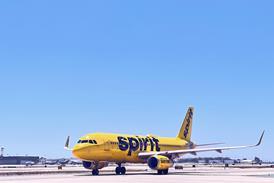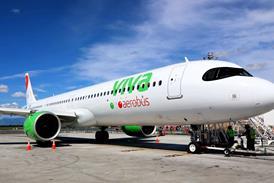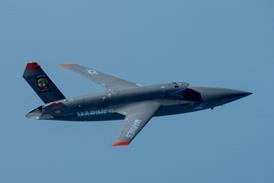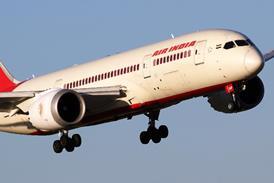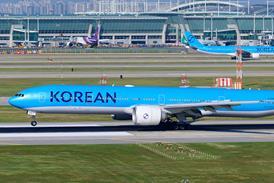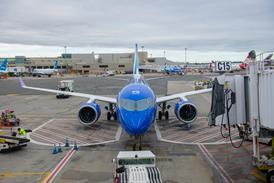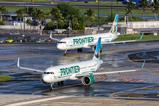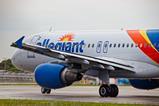Regional airlines are waiting to see how drastically their operations will be reduced by the Federal Aviation Administration’s plan to cut air traffic volumes in key markets to ease pressure on the USA’s increasingly stretched air traffic control (ATC) system.
ATC shortages related to a gruelling, weeks-long US government shutdown prompted the civil aviation regulator to target reductions in “high-traffic markets”. Controllers are now in their second pay period without receiving compensation for their work as an already-strained ATC system starts showing major stress fractures.
Details were still emerging on 6 November as the DOT moved ahead with a plan to reduce US air traffic volumes by about 10% in 40 US cities starting the following day. But some major US operators say that regional flights will face the greatest pullback, with long-haul flights in and out of busy hubs operating normally.
”We are assessing the risk in the airspace,” US Transportation Secretary Sean Duffy said on 6 November. ”Delays and cancellations will be based on which controllers are coming to work. Reducing 10% of flight volume will reduce the pressure on controllers, while prioritising safety and getting more flights out on time.”
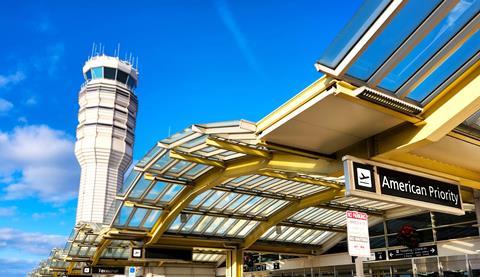
A list of affected airports was released to airlines on 6 November, according to the Associated Press. It covers almost all major US hubs, from Phoenix Sky Harbor International airport to New York’s John F Kennedy International airport. Airlines are bracing for significant disruptions to their regular operating schedules, though they are working to maintain smooth operations through the largest network nodes.
United Airlines chief executive Scott Kirby said on 5 November that the Chicago-based carrier’s international flights “will not be impacted by this schedule-reduction direction from the FAA”.
“That’s important to maintain the integrity of our network, give impacted customers as many options as possible to resume their trip, and sustain our crew pairing systems,” Kirby says.
United will instead trim regional schedules, as well as “domestic mainline flights that do not travel between our hubs”, with Kirby adding that the airline would notify passengers whose itineraries will be disrupted in coming days.
The carrier says that its regional United Express arm would still operate about 4,000 daily flights, and that it will be able to absorb some of the impact of the FAA-mandated pullback because its early November flights have more available seats, compared with peak periods of air travel demand.
’LOWEST COMMON DENOMINATOR’
Aviation analytics provider Cirium defines regional flights as those operated by aircraft with 76-and-fewer seats, though it maintains that the full scope of the impact to those operations is still emerging.
Using Chicago O’Hare International airport as an example, Cirium data show that about half of the airport’s 1,200 flights scheduled for 7 November are operated by regional jets. Schedule reductions would likely result in trimming those flights most heavily, with some narrowbody operations also likely to be affected.
Airline analyst Bill Swelbar of the Swelbar-Zhong Consultancy says that regional flights with fewer seats are the “lowest common denominator”, and cutting some of those flights will have less of an impact than cutting flights on aircraft with more than 150 seats.
“What will be interesting is to learn of the cuts being proposed to the value airline sector, and particularly those that focus their operations on the largest US airports, like Frontier,” he says.
Denver-based ultra-low-cost carrier (ULCC) Frontier Airlines says that it, too, expects most of its schedule to remain unaffected, though it is rolling out a policy for compensating passengers during the shutdown.
”Where changes to flight schedules are necessary, we will pro-actively communicate with impacted customers via email, text and the Frontier mobile app,” the ULCC says. ”Customers whose flights are cancelled or delayed for more than three hours (domestic flights) or six hours (international flights) are able to rebook or to request a refund online.”
FOCUS ON REGIONAL OPERATORS
Most regional operations in the USA are carried out by American Airlines, Delta Air Lines and United, with Alaska Air Group also flying a significant regional fleet under the brand name Horizon Air.
To what degree regional operators will feel the pain remains to be seen. Industry group the Regional Airline Association, for example, says it is still assessing incoming data and declines FlightGlobal’s request to comment on the developing situation.
American says that it will continue operating as normal on 6 November, and that it expects “the vast majority of our customers’ travel will be unaffected” as the reductions go into effect on 7 November. Like United, it has no plans to alter international long-haul schedules, and American says it is working to re-accommodate passengers whose flights are cancelled “for any reason”.
American customers who choose not to travel during the disruptions will be able to “change their flight or request a refund without any penalty”, the airline says.
”In the meantime, we continue to urge leaders in Washington to reach an immediate resolution to end the shutdown,” it adds.
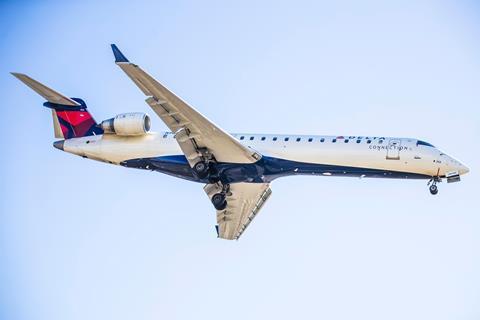
Rounding out the “Big Three” US carriers, Delta says its international operations will be undisturbed by the air traffic reductions.
”We are providing additional flexibility to all of our customers during the impacted travel period to change, cancel or refund their flights, including our basic economy fares, without penalty,” it says.
Democratic and Republican lawmakers have been in a stalemate over healthcare spending that started on 1 October, with few signs of a forthcoming compromise. The shutdown is now the longest in the country’s history.
During the first few weeks of the government closure, signs of ATC-related disruptions did not emerge in air traffic data, despite the growing strain on controllers and reports of some ATC workers taking more sick days.
The Modern Skies Coalition, comprised of dozens of trade groups and workers’ unions, is calling for US lawmakers to end the shutdown and resume funding for essential programmes such as ATC, which is overseen by the FAA.
“This prolonged shutdown has strained the aviation system and its dedicated workforce to unacceptable levels of stress and disruption,” it says. ”The American flying public deserves nothing less than a fully operational aviation system. It’s time for Congress to act decisively.”
FlightGlobal aerosapce editor Jon Hemmerdinger contributed to this report.


